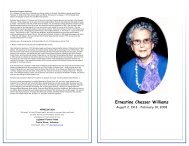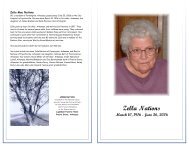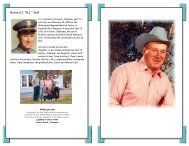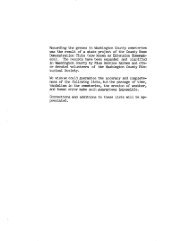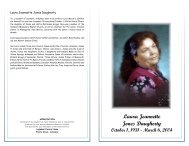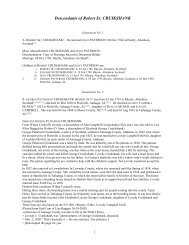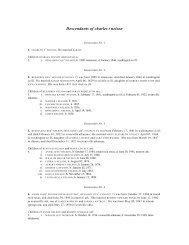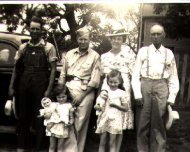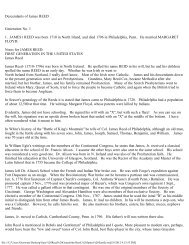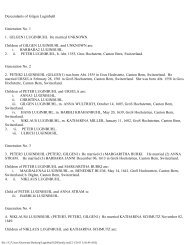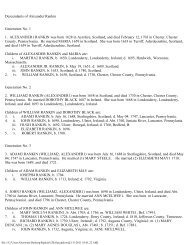Snodgrass Family History Book
The Snodgrass Family History Book - Luginbuel Funeral Home
The Snodgrass Family History Book - Luginbuel Funeral Home
You also want an ePaper? Increase the reach of your titles
YUMPU automatically turns print PDFs into web optimized ePapers that Google loves.
volunteered under Capt. Gabriel Hayes to go and join<br />
General Washington at Yorktown, Virginia. However before<br />
they arrived at Yorktown Cornwallis had surrendered so<br />
William was discharged and sent home. Years later (in<br />
1832) he said that he had served a combined total of two<br />
years and eleven months active duty \vith the Virginia<br />
forces.<br />
Within a few years of their marriage they 1noved from<br />
Virginia to Sullivan County. North Carolina (later part of<br />
Tennessee). In 1789/1790 William received "Purchase<br />
Grant"# 1523 (named thus because it was paid for by cash or<br />
scrip or certificates) for 100 acres of land in Sullivan<br />
County. North Carolina. Also granted land in Sullivan<br />
County six years earlier was a John <strong>Snodgrass</strong> who may<br />
have been one of his brothers and the reason why William<br />
settled in that area. A number of early land grants arc<br />
recorded to him in that county from 1790 through 1797. and<br />
there were many conveyances of land to and from William<br />
in the later county records. Over the years he was to become<br />
a man of considerable substance, as indicated by his will.<br />
William was commissioned as a 1st Lieutenant in the<br />
Sullivan County. North Carolina (Tennessee) Militia on 25<br />
October 1790 by Territorial Governor William Blount.<br />
lie was on the Sullivan County. Tennessee tax list for 1796<br />
and was taxed on one white poll. two black polls. and 1100<br />
acres of land - which is evidence that he had rapidly<br />
increased his land holdings.<br />
On I 0 October 1796 he was commissioned a Captain in the<br />
Sullivan County Regiment, and on 16 June 1801 he was<br />
appointed First Major in the same regiment in the place of<br />
Francis Berry who had resigned.<br />
It should be noted that the census of Sullivan County for the<br />
years of 1800, 1810. and 1820 no longer exist. so nothing<br />
can be learned from these sources about the composition of<br />
his family.<br />
<strong>Snodgrass</strong> <strong>Family</strong> Documents, Stories & Articles<br />
was why he was addressed in later years as "Colonel", and<br />
that it was not the usual honorary title.<br />
During the 1830 census he was living in Sullivan Courity,<br />
Tennessee and his household then consisted of himself b<br />
between 1760-1770, one male b between 1790-1800. one<br />
female b between 1800-181 O. and two males and one female<br />
born between 1825-1830. plus 5 slaves. This was probably a<br />
son and wife and family (although it could also be a<br />
daughter and family) who lived with him then.<br />
William applied in 1832 for a pension based on his<br />
Revolutionary War service and his application and the<br />
supporting documents arc the source for much of the data set<br />
forth herein.<br />
He was ultimately in 1833 awarded a pension of $80 per<br />
year (Certificate #5,933). In various associated documents<br />
in 1834 and 1843 he gave his Post Office as Abington,<br />
Tennessee.<br />
During the 1840 census he was still living in Sullivan<br />
County, Tennessee and his household then consisted of<br />
himself as b between 1750-1760 (census error particularly<br />
since the census also identified him as a pensioner then age<br />
80). one female b between 1790-1800. one male and one<br />
female b between 1825-1830. one male and one female b<br />
between 1830-1835, and one female b between !835-I840<br />
plus 8 slaves. The other members of his family then were<br />
supposed to be the widow of his son James. Elizabeth (Gray)<br />
<strong>Snodgrass</strong>, plus their children.<br />
William is known to have owned a plantation midway<br />
between Blountville and Bristol, Tennessee and to have<br />
entertained most hospitably here. It was one of Andrev.•<br />
Jackson's favorite resting places when on his way to and<br />
from Washington.<br />
William wrote his will in Sullivan County, Tennessee on 11<br />
May 1842, seven years before his actual death. He<br />
bequeathed his son David S 1200, his daughter Nancy Meek<br />
William <strong>Snodgrass</strong> and John Tipton were Representatives in and her heirs S800, his daughter Sarah White and her heirs<br />
the Tennessee Legislature from Sullivan County in 1803- $1200. his daughter Rebecca Gillenwater and her heirs<br />
1804. When Jefferson Academy at Blountville was founded $1800, his daughter Mary Cox and her heirs S800 and his<br />
in 1806 he was made a member of the first board of trustees. New l-Iouse Plantation, the heirs of his deceased son James<br />
the two plantations on which they then lived plus stock,<br />
In the I 812 tax list of Sullivan County he was the William utensils, two wagons, six Negroes and $500, and to his<br />
<strong>Snodgrass</strong> who was listed as living in Captain <strong>Snodgrass</strong>' daughter Jenny Fleming and her heirs $550 (they had<br />
District (himself) and he was then taxed on three black polls already received a proportionate share of his estate). After<br />
and 450 acres of land. It is likely that it was also he who all the bequests were filled he stated that any overage was to<br />
was jointly taxed as "<strong>Snodgrass</strong> and Rhea" that same year on be divided between Joel Gillenwater's children and John<br />
629 acres.<br />
Fleming's children. Witnesses to his will were William<br />
Decry. David Shaver and F. Sturm.<br />
William served in the "Early Indian Wars" as Co1nmander of<br />
the Cherokee Indians at Fort Annstrong and he was Major, He commented in one letter written in May 1843 (Draper<br />
Lieutenant Colonel. and Colonel of William Lillard's 22nd MSS) that his health was then on the decline "like all old<br />
Regiment of East Tennessee Volunteers from 4 January people", and that he had lost his hearing so that he got little<br />
1814 to 18 February 1814. It should be noted here that this satisfaction in conversation with his friends.<br />
719101 The Norwood <strong>Family</strong> <strong>History</strong> Page I0-164



